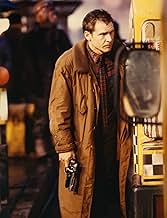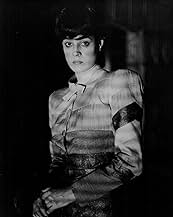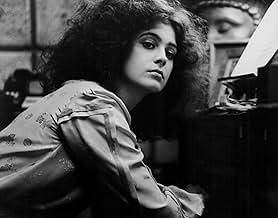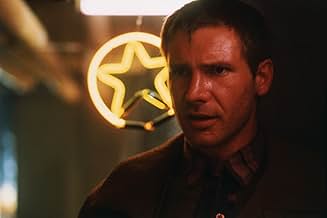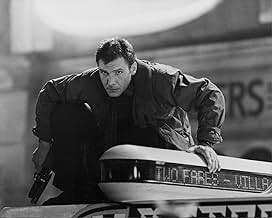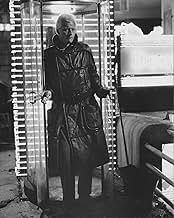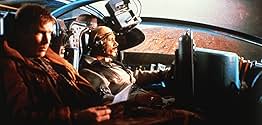A blade runner must pursue and terminate four replicants who stole a ship in space and have returned to Earth to find their creator.A blade runner must pursue and terminate four replicants who stole a ship in space and have returned to Earth to find their creator.A blade runner must pursue and terminate four replicants who stole a ship in space and have returned to Earth to find their creator.
- Director
- Writers
- Stars
- Nominated for 2 Oscars
- 13 wins & 22 nominations total
Kimiko Hiroshige
- Cambodian Lady
- (as Kimiro Hiroshige)
Bob Okazaki
- Sushi Master
- (as Robert Okazaki)
- Director
- Writers
- All cast & crew
- Production, box office & more at IMDbPro
8.1870.3K
1
2
3
4
5
6
7
8
9
10
Summary
Reviewers say 'Blade Runner' is acclaimed for its deep themes, striking visuals, and intricate story, often noting its examination of humanity, identity, and artificial life ethics. Many commend its philosophical richness and immersive world, blending film noir with sci-fi. However, some find the pacing slow and characters underdeveloped. Debate exists over different cuts, with preferences varying between the original and director's cut. The soundtrack and special effects, though innovative, receive mixed reviews, with some considering them dated or mood-dependent.
Featured reviews
Best movie ever
Just my personal opinion. Everything is perfect about this movie. I saw the movie the first time when I was 12 and it was mind blowing for me. 38 years later I feel the same about this movie. Timeless and beautiful. For me 10/10 with a star and smile
A Milestone Of Science Fiction And A Cyberpunk Masterpiece
A feast for the eyes. Dark and uncompromising. With a haunting musical score by Vangelis that adds a hypnotic quality to those breathtaking megacity landscapes of future Los Angeles. Ridley Scott's adaptation of Philip K. Dick's post-apocalyptic bounty hunter story 'Do Androids Dream Of Electric Sheep' is a visionary work of art; it's a dystopian masterpiece and I'd personally call it as much a milestone of science fiction as Kubrick's '2001' (and be advised to watch the version known as the "final cut" if you want to catch 'Blade Runner' as it was intended by its director).
It's hard to overstate how influential the film was; it invented the sci-fi subgenre now known as "cyberpunk", and it was also the first "film noir" in a sci-fi setting. And although it looks so distractingly gorgeous that even today there are people who still dismiss it as superficial and mere "eye candy", it is a philosphically deep film that ponders existential questions about the nature of being human. Its slow, brooding quality will perhaps leave some modern audiences who are used to a different pace and more action underwhelmed - but make no mistake: this is a groundbreaking masterwork of its genre and a timeles classic. 10 stars out of 10.
Favorite films: IMDb.com/list/mkjOKvqlSBs/
Lesser-Known Masterpieces: imdb.com/list/ls070242495/
It's hard to overstate how influential the film was; it invented the sci-fi subgenre now known as "cyberpunk", and it was also the first "film noir" in a sci-fi setting. And although it looks so distractingly gorgeous that even today there are people who still dismiss it as superficial and mere "eye candy", it is a philosphically deep film that ponders existential questions about the nature of being human. Its slow, brooding quality will perhaps leave some modern audiences who are used to a different pace and more action underwhelmed - but make no mistake: this is a groundbreaking masterwork of its genre and a timeles classic. 10 stars out of 10.
Favorite films: IMDb.com/list/mkjOKvqlSBs/
Lesser-Known Masterpieces: imdb.com/list/ls070242495/
Timeless
What can be said about this film that hasn't already been covered in preceding decennia? Blade Runner (either version) stands the test of time as an epic story which transcends a disparity of genres, as well as the seminal "dark" sci-fi film which has been mimicked so frequently (to varying degrees of success) since its original release. The interplay of film noir, sci-fi, and what is one of the most philosophically symbolic and academically analyzed narratives of the modern era holds its ground on both visual and cerebral levels even in the face of today's CGI laden blockbusters. The new director's cut, contrary to many cinematic re-hashings, actually serves to clarify many of the more nebulous aspects of the plot and makes a great film even better, arguably allowing it to be modernized and polished for a new generation of viewers who are more picky and yet simultaneously less idealistic. All while sustaining the feeling and flavor of the original. Call it restorative work if you will. The tinny and meandering score by Vangelis is pure 1980s at its most brooding and fits the texture and mood of the film beautifully. Indeed, for many reasons, finding this film in someone's DVD collection makes a true statement about their discriminating and refined taste in movies, and equally their appreciation of film as an artistic medium. I would suggest picking up a reader by someone like Nietzsche, Foucualt, Descartes, Kierkegaard, or any of the great existentialist philosophers after viewing this film in order to appreciate the story & its concepts at a whole new level, regardless if you're watching it for either the 1st, or the 100th time. An enduring classic and an intrepid piece of film-making with rich & often haunting visuals designed to entertain and promote introspection amongst its viewers. 9/10.
Finest hour.
This is simply Scott's finest hour. There are a sheer plethora of futuristic films with vision. Films which crudely grope into a possible time ahead,when perhaps a post apocalyptic era is scattered with cliché upon cliché and often miss the whole point. What Ridley Scott achieved with this film,is an entirely possible scenario. It really does feel like a science fiction novel brought to life,but not so much as its derivative penned by Phillip K Dick(do androids dream of electric sheep?). Its a grimy,violent world inhabited by the sick,lower class,villainous second citizens who haven't quite made the grade for the off world colonies. We have a true smelting pot of nationalities.The heavy eastern references within china town like inner cities is particularly poignant.
This film also sees Ford in perfect casting.Theirs a rye charm that Ford has that no other actor could fake or fill quite as effortlessly. Its a mixed review depending on what version you have seen. For me,the directors cut is simply too cut. I preferred the audience friendly screening which had the wonderful narration. The finest moment with this narration has to be the moments described by Batty in his dying eyes and the summing up by Ford of this man/machines passion and love for life.. No other sci-fi futuristic film has ever made the grade before or since in my humble opinion. It captured the raw smells and light of a brutal future scarily depicted in films or even so well. From the chase scene with Zora to the flybys over the city capturing a stunning skyline,chimneys and skyscrapers in one shot. This is my favourite movie of all time for all the reasons above and many more i could effortlessly type all day and night.
This film also sees Ford in perfect casting.Theirs a rye charm that Ford has that no other actor could fake or fill quite as effortlessly. Its a mixed review depending on what version you have seen. For me,the directors cut is simply too cut. I preferred the audience friendly screening which had the wonderful narration. The finest moment with this narration has to be the moments described by Batty in his dying eyes and the summing up by Ford of this man/machines passion and love for life.. No other sci-fi futuristic film has ever made the grade before or since in my humble opinion. It captured the raw smells and light of a brutal future scarily depicted in films or even so well. From the chase scene with Zora to the flybys over the city capturing a stunning skyline,chimneys and skyscrapers in one shot. This is my favourite movie of all time for all the reasons above and many more i could effortlessly type all day and night.
A futuristic allegory about the value of life
OK, I admit...the first time I watched this movie I detested it. But hey, I was 16 years old and had expected an action-packed sci-fi adventure. Blade Runner is not such a film. But I am grateful for this, for after maturing a bit and rewatching the movie a couple of times, I discovered its greatness. It is not a traditional sci-fi movie, it's a touching drama about the value of life and the importance of making the most of what you've got. One of the most important themes in the film is the question of what is more valuable - humans without emotions, or machines with? The film gives no answer - it just opens our eyes and makes us aware that we should be grateful for being alive.
Some people prefer the Director's Cut, but I like the original version better - mostly because of the wonderful end line: "I didn't know how long we had together. Who does?" That pretty much sums it up.
Some people prefer the Director's Cut, but I like the original version better - mostly because of the wonderful end line: "I didn't know how long we had together. Who does?" That pretty much sums it up.
The Life and Times of Harrison Ford
The Life and Times of Harrison Ford
Take a look back at Harrison Ford's movie career in photos.
Did you know
- TriviaAfter Philip K. Dick saw Harrison Ford as Rick Deckard on-set, Dick declared: "He has been more Deckard than I had imagined. It has been incredible. Deckard exists!"
- Goofs(at around 9 mins) When we see Deckard waiting for his noodles, he is reading that day's newspaper. Later in Leon's apartment (at around 25 mins), the same newspaper is seen in one of the drawers, except it is old and soiled, as if it has been there for years. We know they are the same since both newspapers have the same headline about farming on the moon.
- Crazy creditsIn the "happy ending" Theatrical/International cuts, the credits play over the gorgeous scenery. In later Director/Final cuts, they play over a normal black background.
- Alternate versionsAll U.S video tape releases before January 1993 are the unrated version and contain the extra violence in the Euro-release that's not seen in the 117 minute American theatrical release:
- When Roy attacks Tyrell we clearly see him pushing his thumbs into Tyrell's eyes, and blood spurting out
- When Pris (Daryl Hannah) attacks Deckard, she reaches down and grabs him by the nostrils
- When Deckard shoots Pris, he shoots 3 times instead of 2
- When Roy pushes the nail through his hand, there is a shot of the nail coming through the skin on the other side.
- ConnectionsEdited into Off the Air: Falling (2012)
- SoundtracksHarps of the Ancient Temples
Composed by Gail Laughton
Performed by Gail Laughton
Courtesy of Laurel Records
Details
- Release date
- Countries of origin
- Official site
- Languages
- Also known as
- Dangerous Days
- Filming locations
- Production companies
- See more company credits at IMDbPro
Box office
- Budget
- $28,000,000 (estimated)
- Gross US & Canada
- $32,914,489
- Opening weekend US & Canada
- $6,150,002
- Jun 27, 1982
- Gross worldwide
- $41,786,115
- Runtime
- 1h 57m(117 min)
- Color
- Sound mix
- Aspect ratio
- 2.39 : 1
Contribute to this page
Suggest an edit or add missing content








